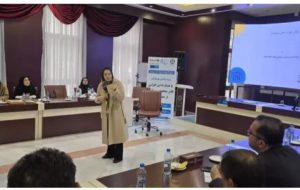Training workshop held on “adolescent positive parenting”
TEHRAN – The United Nations Children’s Fund (UNICEF) in cooperation with the Ministry of Health and Medical Education (MoHME) and the Ministry of Education (MoE) has organized a comprehensive training workshop on “Adolescent Positive Parenting” in Mashhad, Khorasan Razavi Province, to ensure adolescents in vulnerable areas will benefit from supportive environment. This intensive eight-day training,


TEHRAN – The United Nations Children’s Fund (UNICEF) in cooperation with the Ministry of Health and Medical Education (MoHME) and the Ministry of Education (MoE) has organized a comprehensive training workshop on “Adolescent Positive Parenting” in Mashhad, Khorasan Razavi Province, to ensure adolescents in vulnerable areas will benefit from supportive environment.
This intensive eight-day training, conducted in two four-day rounds in December, brought together 90 psychologists, counselors, and mental health practitioners from Primary Healthcare Centres (PHCs), schools, and community centres. The programme, funded by EU Humanitarian Aid (ECHO), the UNICEF website announced in a press release on December 23.
The workshop aimed to enhance their knowledge, skills, and technical expertise in delivering positive parenting programmes tailored specifically for parents of adolescents.
As part of a UNICEF-supported initiative, parents of adolescents in vulnerable districts are empowered with hands-on training in positive parenting skills.
The goal is to establish supportive and nurturing environments for adolescents in vulnerable and disadvantaged communities.
The “Adolescent Positive Parenting” package, developed with UNICEF’s support, includes three detailed manuals and workbooks for trainers, parents, and adolescents. It also features 17 educational films for trainers, five videos for parents, and five motion graphics designed to enhance learning and engagement.
To conduct the workshop, the Drug Control Headquarters (DCHQ), Provincial Drug Coordination Council (DCCC), Iranian Academy for Child and Adolescent Psychiatry, and a local non-governmental organization collaborated with UNICEF, as well.
In the initial phase, the trained professionals will reach out to at least 1,600 parents in Khorasan Razavi Province, offering them practical training on positive parenting skills.
This initiative is part of a broader effort to scale up adolescent parenting programmes initially launched in Qom Province for vulnerable parents.
Over 4,000 parents of adolescents in marginalised areas of Qom have participated in at least eight sessions of parenting training, demonstrating the programme’s success in fostering stronger family relationships and adolescent well-being.
In 2025, another province will be selected for the third round of training.
By collaborating with key governmental and non-governmental organisations, UNICEF continues to expand its reach, ensuring that adolescents and their families in vulnerable districts receive the essential support and guidance they need for a brighter future.
Empowering adolescents
Under a newly launched initiative, titled Green DADRAS, the Iranian Red Crescent Society (IRCS) and the UNICEF in collaboration with the Climate Change Secretariat aim to promote students’ climate literacy.
A total of 11,536 high school students, girls and boys aged 12 to 15 years, from across Iran will benefit from the educational program, the UNICEF website announced in a press release on August 22.
By raising awareness and promoting proactive measures, the IRCS and UNICEF aim to create a positive environmental impact and contribute to a more sustainable future for all.
The newly launched Green DADRAS Initiative, guided by the Climate Change Secretariat of the IRCS, has equipped 46 master trainers from the Youth Organization of the IRCS to lead educational sessions on climate change for these school students.
These dedicated trainers will train 824 provincial trainers across the country to finally empower over 11,000 high school students within DADRAS teams, focusing on critical topics such as drought and floods.
The initiative will enable these students to design and implement impactful climate change-related campaigns within their schools and communities.
Having received education on the importance of climate change, these young minds will then be equipped with the knowledge and tools they need to make informed decisions and take proactive measures to protect their environment.
In April, the ministry of education and the UNICEF held a workshop for principals of Upper Secondary Boarding Schools from 10 provinces to boost their capacities in developing students’ skills which are essential to find a decent job.
The four-day long workshop was held from April 27 to 30. A total of 90 Upper Secondary Boarding School principals from 10 provinces of Kordestan, Kermanshah, Hamedan, Ilam, Zanjan, Markazi, Qazvin, Ardebil, West and East Azarbaijan attended the workshop.
UNICEF’s collaboration with the ministry of education focuses on adolescents in boarding schools, which are secondary schools in disadvantaged parts of the country.
The training opportunity provides school principals with the necessary knowledge and skills to support the students, at these schools in rural and remote regions, in improving their self-assurance, problem-solving, and teamwork skills.
This series of workshops marks the initial phase that will span across all provinces throughout the year, the UNICEF website announced in a press release on May 9.
Upon finishing the current series of workshops, UNICEF will focus on supporting the Boarding Schools on enhancing students’ access to transferable skills such as digital literacy and entrepreneurship to prepare the adolescents for a smooth transition from learning to earning through alternative learning pathways.
In May, Adolescents Well-being and Empowerment Centers, known as MASERRAT, in Mashhad and Kermanshah cities revised and reviewed their protocols to make sure the adolescent girls receive the most efficient and high-quality services.
Adolescent girls aged 10-19 who are participating in well-being and empowerment programs supported by UNICEF will benefit from a significant improvement in the quality of services provided, the UNICEF website reported on May 6.
These changes resulted from a consultative workshop to review and modify the protocols.
The protocols included a wide range of procedures and measures based on which services such as healthy lifestyle, psychological health support, social and life skills, increased meaningful participation, prevention from drug abuse, social harms, and risky behaviors, as well as increased resiliency and self-care.
MT/MG
